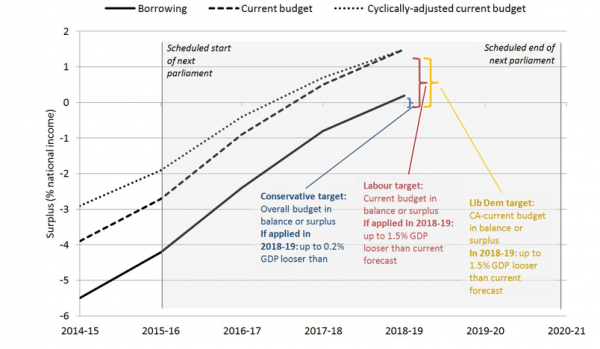Politicians are often keen on making targets to eliminate budget deficits by a certain year. There is a strong political motivation to be seen as strong and committed to reducing government debt. Politicians who are vague about the debt are often heavily criticised and it is seen as poor politics. An advantage of budget deficit targets is that it ensure politicians have a stronger commitment to make politically difficult choices – raising taxes or cutting spending.
However, from an economic perspective targets for reducing budget deficits are not always as helpful as they may seem.
Benefits of budget deficit targets
There can be many sound economic reasons for reducing government borrowing. Just because a government can borrow, doesn’t mean it is desirable to.
- It can prevent politicians choosing politically popular policies, such as tax cuts and spending increases. A deficit target can help prevent politicians putting off making difficult choices.
- Without deficit reduction targets, some economists fear that there is an incentive to keep increasing the size of government spending, which crowds out more efficient private sector spending.
- It can reassure markets that the government have a ‘responsible attitude to debt’ and are less likely to rely on printing money to finance the deficit and rely on inflation to inflate away the debt – which can reduce the real value of government bonds.
- In some cases reducing the budget deficit can help lower bond yields because – with lower debt available on the market there is downward pressure on bond yields.
- Some argue that budget deficit reduction gives consumers more to spend and firms to invest because the private sector have more confidence when the government is reducing its debt and is acting in a ‘responsible manner’. Others criticise this as being wishful thinking (see: Confidence fairy)
Problems of a budget deficit target
- To stick to a strict budget deficit target may require tax increases / spending cuts at a time which is not appropriate for the economy. e.g. the UK economy is recovering, but if we increase income tax rates to improve tax receipts it may lead to lower growth and be counter-productive. See: Austerity can be self-defeating
- Experience of Eurozone economies trying to meet budget deficit targets has been a deep recession.
- Achieving an overall budget deficit means government have to finance investment spending out of tax revenue. But, arguably there is a better case for allowing government to borrow to finance investment.
- A zero budget deficit is of doubtful value compared to other macro-economic objectives such as full employment, sustainable economic growth and low inflation.
What factors determine the desirability of deficit reduction?
It depends on several factors, such as:
- State of economic cycle – e.g. in recession with falling private sector spending, there is strong case for higher government borrowing. In time of economic boom with rising spending and falling private sector saving, there is strong case for reducing a government budget deficit.
- Any unexpected shock which affects growth or tax revenues. This is the problem with fixed deficit targets – if there is an economic shock it may be necessary to increase government borrowing rather than cut it. A fixed deficit target eliminates flexibility.
- How the government is using the borrowing? e.g. is the government borrowing to finance investment. e.g. investment in infrastructure which can increase economic growth in the long term.
- Level of private sector saving and type of saving. Is the private sector willing to buy government bonds and thereby finance the government borrowing?
- Level of interest rates on government debt. If bond yields are low 1-2%, this means it is cheap for the government to borrow and indicates there is high demand for buying government bonds. With low interest rates it makes government investment more attractive.
Fixed Budget deficit Target
A fixed budget deficit target is a simple commitment to reduce borrowing to a certain level within say five years.
- For example the Treasury’s official target of reducing borrowing to £95.5bn in 2014-15 from £105.8bn in 2013-14.
- Or a target to eliminate the budget deficit by 2019.

Source: IFS
Rolling deficit
- UK political parties approach to deficit reduction IFS
- Let it roll – A case for rolling budget deficits at Mainly Macro

There’s a simple solution to the dilemma you correctly set out, the dilemma being this.
The items under your heading “Benefits of budget deficit targets” essentially boil down to saying that such targets help prevent irresponsibility by politicians.
But against that, as you rightly point out, “strict budget deficit target may require tax increases / spending cuts at a time which is not appropriate for the economy”. Now there’s a simple solution to that dilemma: it’s to bar politicians from any say on stimulus, i.e. the size of the deficit.
Having an independent central bank PARTIALLY removes decisions on stimulus from politicians. While Positive Money’s Money Creation Committee would TOTALLY REMOVE all decisions on stimulus from politicians, while leaving legitimate political decisions (like what proportion of GDP should be allocated to public spending and how that should be split between education, defence, etc) in the hands of the electorate and politicians.
In short, Positive Money’s system solves the above dilemma.